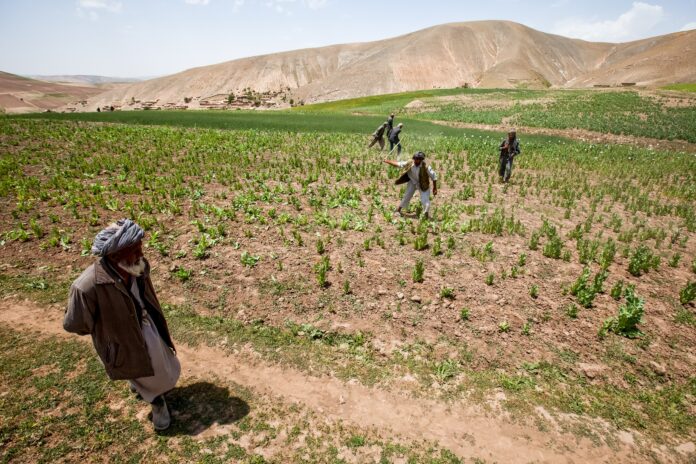The Afghan authorities have stepped up their war on narcotics over the past year, leading to an unprecedented decline in the cultivation of opium poppies.
According to official statistics, in the past year the Islamic Emirate has seized more than 500 tons of drugs and arrested a large number of drug traffickers, including foreign citizens.
Afghanistan used to produce more than 80% of the world’s opium, and heroin made from Afghan opium makes up 95% of the market in Europe.
According to a BBC report, David Mansfield, a leading expert on Afghanistan’s drugs trade, is working with Alcis – a UK firm which specialises in satellite analysis.
He said: “It is likely that… Alcis’s analysis shows that poppy cultivation in Helmand has reduced by more than 99%. The high resolution imagery of Helmand province shows that poppy cultivation is down to less than 1,000 hectares when it was 129,000 hectares the previous year… Cultivation will be less than 20% of what it was in 2022. The scale of the reduction will be unprecedented.”
In a recent meeting with the local officials of Ghazni and Zabul, the Deputy Minister of Narcotics Control of the Ministry of Interior said that the Islamic Emirate of Afghanistan will not allow anyone to cultivate, produce, smuggle and sell drugs.
Lieutenant General Abdul Haq, deputy deputy of counter-narcotics in that ministry, advised local officials to implement the decree of IEA leader Sheikh Hibatullah Akhundzadeh regarding the destruction of poppy plantations.
Subscribe to our newsletter and stay updated on the latest news and updates from around the Muslim world!
He emphasised that the Islamic Emirate of Afghanistan has a serious commitment in fighting against the “evil phenomenon of drugs.”
The Deputy Counter Narcotics Department of the Ministry of Interior announced that four thousand hectares of poppy cultivation land in Afghanistan had been destroyed so far.
Haseebullah Ahmadi said: “The process of destroying poppy fields is currently underway in five provinces… In the central provinces of the country, around 4,000 hectares of land have been cleared of drug use.”
Kabul Police Command have announced that after the IEA came to power, thousands of people have been arrested in connection with drug trafficking.
And Zabihullah Mujahid, the spokesman of the Islamic Emirate of Afghanistan, said that drug trafficking in Afghanistan will soon reach zero.
He added: “We assure the near and far countries not to worry about drug smuggling from Afghanistan, and to cooperate with the government and people of Afghanistan in this fight as well as providing alternatives to cultivation. And we assure you that there will be no drug centre in Afghanistan.”
In a series of recent decrees the leader of the Islamic Emirate, Sheikh Hibatullah Akhundzadeh, said narcotics in Afghanistan should be addressed as a national and trans-regional problem, and along with Afghan government institutions, countries and international institutions should be coordinated and mobilised.
Decrees by Sheikh Hibatullah prohibit the cultivation and production of all kinds of narcotics and so that Afghanistan’s name will not be tarnished.
The Anti-Narcotics law approves the fight against the cultivation of opium and marijuana, as well as the manufacturing processes, buying, selling, supplying, exporting, maintaining, transporting and using drugs, as well as treating addicts.
Any person who commits drug trafficking and other drug-related offices will be punished according to Shariah rules.



















